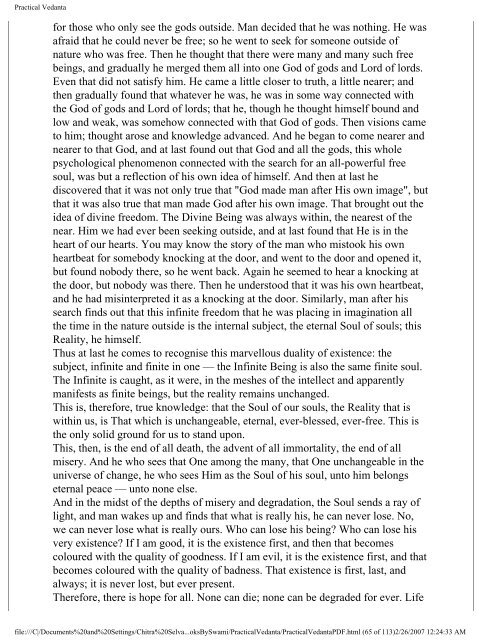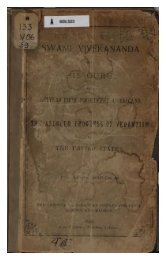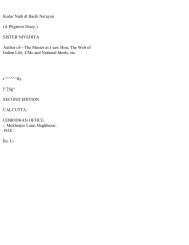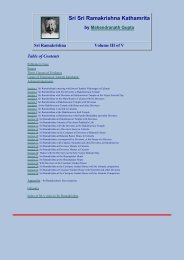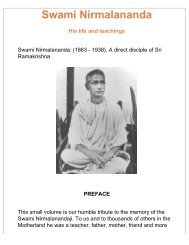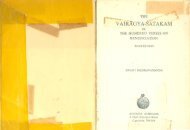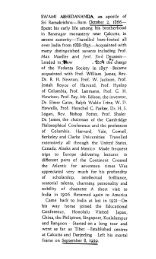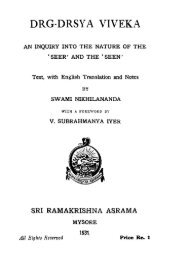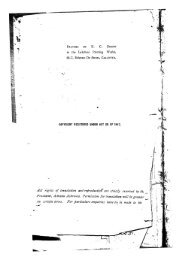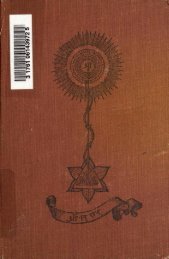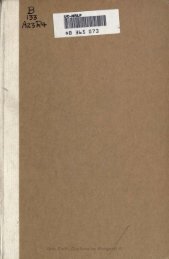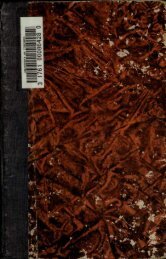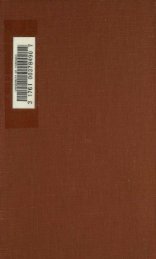<strong>Practical</strong> <strong>Vedanta</strong>What is high and what is low in this marvellous interdependence of existencewhere the smallest atom is necessary for the existence of the whole? Who is greatand who is small? It is past finding out! And why? Because none is great and noneis small. All things are interpenetrated by that infinite ocean; their reality is thatinfinite; and whatever there is on the surface is but that infinite. The tree isinfinite; so is everything that you see or feel — every grain of sand, every thought,every soul, everything that exists, is infinite. Infinite is finite and finite infinite.This is our existence.Now, that may be all true, but all this feeling after the Infinite is at present mostlyunconscious. It is not that we have forgotten that infinite nature of ours: none canever do that. Who can ever think that he can be annihilated? Who can think that hewill die? None can. All our relation to the Infinite works in us unconsciously. In amanner, therefore, we forget our real being, and hence all this misery comes.In practical daily life we are hurt by small things; we are enslaved by little beings.Misery comes because we think we are finite — we are little beings. And yet, howdifficult it is to believe that we are infinite beings! In the midst of all this miseryand trouble, when a little thing may throw me off my balance, it must be my careto believe that I am infinite. And the fact is that we are, and that consciously orunconsciously we are all searching after that something which is infinite; we arealways seeking for something that is free.There was never a human race which did not have a religion and worship somesort of God or gods. Whether the God or gods existed or not is no question; butwhat is the analysis of this psychological phenomenon? Why is all the worldtrying to find, or seeking for, a God? Why? Because in spite of all this bondage, inspite of nature and this tremendous energy of law grinding us down, neverallowing us to turn to any side — wherever we go, whatever we want to do, weare thwarted by this law, which is everywhere — in spite of all this, the humansoul never forgets its freedom and is ever seeking it. The search for freedom is thesearch of all religions; whether they know it or not, whether they can formulate itwell or ill, the idea is there. Even the lowest man, the most ignorant, seeks forsomething which has power over nature's laws. He wants to see a demon, a ghost,a god — somebody who can subdue nature, for whom nature is not almighty, forwhom there is no law. "Oh, for somebody who can break the law!" That is the crycoming from the human heart. We are always seeking for someone who breaks thelaw. The rushing engine speeds along the railway track; the little worm crawls outof its way. We at once say, "The engine is dead matter, a machine; and the wormis alive," because the worm attempted to break the law. The engine, with all itspower and might, can never break the law. It is made to go in any direction manwants, and it cannot do otherwise; but the worm, small and little though it was,attempted to break the law and avoid the danger. It tried to assert itself againstlaw, assert its freedom; and there was the sign of the future God in it.Everywhere we see this assertion of freedom, this freedom of the soul. It isreflected in every religion in the shape of God or gods; but it is all external yet —file:///C|/Documents%20and%20Settings/Chitra%20Selva...oksBySwami/<strong>Practical</strong><strong>Vedanta</strong>/<strong>Practical</strong><strong>Vedanta</strong>PDF.html (64 of 113)2/26/2007 12:24:33 AM
<strong>Practical</strong> <strong>Vedanta</strong>for those who only see the gods outside. Man decided that he was nothing. He wasafraid that he could never be free; so he went to seek for someone outside ofnature who was free. Then he thought that there were many and many such freebeings, and gradually he merged them all into one God of gods and Lord of lords.Even that did not satisfy him. He came a little closer to truth, a little nearer; andthen gradually found that whatever he was, he was in some way connected withthe God of gods and Lord of lords; that he, though he thought himself bound andlow and weak, was somehow connected with that God of gods. Then visions cameto him; thought arose and knowledge advanced. And he began to come nearer andnearer to that God, and at last found out that God and all the gods, this wholepsychological phenomenon connected with the search for an all-powerful freesoul, was but a reflection of his own idea of himself. And then at last hediscovered that it was not only true that "God made man after His own image", butthat it was also true that man made God after his own image. That brought out theidea of divine freedom. The Divine Being was always within, the nearest of thenear. Him we had ever been seeking outside, and at last found that He is in theheart of our hearts. You may know the story of the man who mistook his ownheartbeat for somebody knocking at the door, and went to the door and opened it,but found nobody there, so he went back. Again he seemed to hear a knocking atthe door, but nobody was there. Then he understood that it was his own heartbeat,and he had misinterpreted it as a knocking at the door. Similarly, man after hissearch finds out that this infinite freedom that he was placing in imagination allthe time in the nature outside is the internal subject, the eternal Soul of souls; thisReality, he himself.Thus at last he comes to recognise this marvellous duality of existence: thesubject, infinite and finite in one — the Infinite Being is also the same finite soul.The Infinite is caught, as it were, in the meshes of the intellect and apparentlymanifests as finite beings, but the reality remains unchanged.This is, therefore, true knowledge: that the Soul of our souls, the Reality that iswithin us, is That which is unchangeable, eternal, ever-blessed, ever-free. This isthe only solid ground for us to stand upon.This, then, is the end of all death, the advent of all immortality, the end of allmisery. And he who sees that One among the many, that One unchangeable in theuniverse of change, he who sees Him as the Soul of his soul, unto him belongseternal peace — unto none else.And in the midst of the depths of misery and degradation, the Soul sends a ray oflight, and man wakes up and finds that what is really his, he can never lose. No,we can never lose what is really ours. Who can lose his being? Who can lose hisvery existence? If I am good, it is the existence first, and then that becomescoloured with the quality of goodness. If I am evil, it is the existence first, and thatbecomes coloured with the quality of badness. That existence is first, last, andalways; it is never lost, but ever present.Therefore, there is hope for all. None can die; none can be degraded for ever. Lifefile:///C|/Documents%20and%20Settings/Chitra%20Selva...oksBySwami/<strong>Practical</strong><strong>Vedanta</strong>/<strong>Practical</strong><strong>Vedanta</strong>PDF.html (65 of 113)2/26/2007 12:24:33 AM
- Page 1 and 2:
Practical VedantaPractical VedantaP
- Page 3 and 4:
Practical Vedantaworld. If I am a s
- Page 5 and 6:
Practical Vedantadifference is only
- Page 7 and 8:
Practical VedantaThe ideal of faith
- Page 9 and 10:
Practical Vedantamoment of our live
- Page 11 and 12:
Practical Vedantaof the Christs and
- Page 13 and 14: Practical Vedanta"This life is Brah
- Page 15 and 16: Practical Vedantadark fifteen days,
- Page 17 and 18: Practical Vedantalife. This is the
- Page 19 and 20: Practical Vedantaeverything would b
- Page 21 and 22: Practical Vedantait is only through
- Page 23 and 24: Practical Vedantawhich is that subt
- Page 25 and 26: Practical Vedantanoumenon and pheno
- Page 27 and 28: Practical Vedantato which is the be
- Page 29 and 30: Practical VedantaAbsolute.The finit
- Page 31 and 32: Practical Vedantawhich is not the q
- Page 33 and 34: Practical Vedantaexperience that th
- Page 35 and 36: Practical Vedantafulfilled. The Jiv
- Page 37 and 38: Practical Vedantabetween the pure r
- Page 39 and 40: Practical Vedantacome out straight.
- Page 41 and 42: Practical Vedantawar with one anoth
- Page 43 and 44: Practical Vedantanobody could under
- Page 45 and 46: Practical VedantaMy idea, therefore
- Page 47 and 48: Practical Vedantathe same methods.
- Page 49 and 50: Practical Vedantavarious minds, all
- Page 51 and 52: Practical Vedantabrotherhood; but t
- Page 53 and 54: Practical Vedantabrotherhood, but w
- Page 55 and 56: Practical Vedantawe all go with ves
- Page 57 and 58: Practical Vedantareason. What can y
- Page 59 and 60: Practical Vedantabeen preached in t
- Page 61 and 62: Practical Vedantathe husband kisses
- Page 63: Practical Vedantaof the knowledge a
- Page 67 and 68: Practical Vedantasun exists because
- Page 69 and 70: Practical Vedantaof death was pleas
- Page 71 and 72: Practical VedantaGod. We must learn
- Page 73 and 74: Practical Vedantaa plague comes, it
- Page 75 and 76: Practical VedantaAtman? "As with a
- Page 77 and 78: Practical Vedantathat immortal One,
- Page 79 and 80: Practical Vedantaand the third egoi
- Page 81 and 82: Practical VedantaWitness of the uni
- Page 83 and 84: Practical VedantaPractical Vedanta1
- Page 85 and 86: Practical Vedantaeternal ; every ot
- Page 87 and 88: Practical Vedantafaculty, Buddhi, w
- Page 89 and 90: Practical VedantaPractical Vedanta1
- Page 91 and 92: Practical Vedantastepping-stone to
- Page 93 and 94: Practical Vedantarecognition? Findi
- Page 95 and 96: Practical Vedantasentient." This is
- Page 97 and 98: Practical Vedantaessentially differ
- Page 99 and 100: Practical Vedantaexistence is limit
- Page 101 and 102: Practical Vedantalive, for I am lif
- Page 103 and 104: Practical Vedantasee from Kapila's
- Page 105 and 106: Practical Vedantalimitation, but th
- Page 107 and 108: Practical Vedantaperfect, infinite,
- Page 109 and 110: Practical Vedantaindividuality, of
- Page 111 and 112: Practical Vedantarepeat [something]
- Page 113: Practical Vedantaperson who dies in


